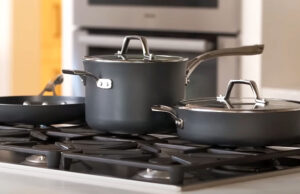Dishwashers are such a time-saver! But have you ever wondered how much electricity they use every month? If you’re curious about your energy bills and want to know how dishwashers affect them, you’ve come to the right place. This article will help you understand just how much power a dishwasher consumes and give you practical tips on saving energy.
Understanding Dishwasher Energy Usage
To start, let’s first break down how a dishwasher works and why it uses electricity. A dishwasher uses electricity in a few key ways: heating water, running the motor, and powering the controls. When you run a dishwasher, it goes through a few steps—washing, rinsing, and drying—which all require different amounts of electricity.
Heating Water: Dishwashers need hot water to clean dishes effectively, which is one of the biggest electricity consumers. The water heater inside your dishwasher usually heats the water to temperatures ranging from 120°F to 160°F (49°C to 71°C).
Running the Motor: The motor runs the dishwasher’s spray arms and helps circulate the water, making sure the detergent and water reach all areas of your dishes. The motor uses electricity, though not as much as heating the water.
Drying Dishes: Some dishwashers use electricity to dry the dishes after washing. This is often done using a heating element or by relying on the residual heat from the wash cycle.
Now that we know how dishwashers use electricity, it’s time to look at how much power they actually consume and how to calculate their monthly energy use.
How to Calculate How Much Electricity a Dishwasher Uses
You might be wondering, “How can I know exactly how much electricity my dishwasher is using each month?” The answer is easier than you think. It all comes down to a simple formula and a few key factors like the dishwasher’s wattage, the number of cycles it runs, and the length of each cycle.
Wattage of Your Dishwasher: Every dishwasher has a specific wattage, which tells you how much electricity it uses per hour. Most dishwashers use anywhere between 1,200 watts to 1,500 watts per hour.
Cycles Per Month: Think about how often you run your dishwasher. For most households, a dishwasher is used about 3-5 times per week. Let’s say your dishwasher runs 20 times a month. This number will help us calculate the total energy used.
Time Per Cycle: Dishwashers usually run for around 1 to 2 hours depending on the cycle selected. Longer cycles, like “Heavy Duty,” will use more electricity compared to shorter ones, such as “Quick Wash.”
The Formula
To calculate the electricity usage, follow this formula:
Dishwasher wattage (kW) × hours per cycle × number of cycles per month = Total electricity used per month (kWh)
For example, if your dishwasher uses 1,300 watts (1.3 kW) per cycle, runs for 2 hours, and you use it 20 times per month:
1.3 kW × 2 hours × 20 cycles = 52 kWh per month
This means your dishwasher uses 52 kilowatt-hours (kWh) of electricity each month. If you know the cost of electricity per kWh in your area, you can then calculate how much this will cost you.
How Much Does It Cost to Run a Dishwasher Every Month?
Now that you know how to calculate the energy usage of your dishwasher, you might be curious about how much this will affect your monthly electric bill. The cost will depend on a few factors, such as the rate your utility company charges for electricity and the efficiency of your dishwasher.
Electricity Rates: The average cost of electricity in the U.S. is about 13 cents per kWh. However, the price can vary depending on where you live.
Dishwasher Efficiency: Modern dishwashers are much more energy-efficient than older models. Dishwashers with an Energy Star rating use less electricity, which means your monthly cost will be lower if you have one of these models.
Let’s continue with the example from above, where your dishwasher uses 52 kWh per month. If your electricity rate is 13 cents per kWh, the monthly cost of running your dishwasher would be:
52 kWh × $0.13 = $6.76 per month
Of course, if your dishwasher uses less power or you run it less often, the cost will be lower. But it’s always good to have an idea of the average costs to keep your energy bill in check.
Energy-Saving Tips for Dishwashers
If you’re looking to save some electricity (and money!), there are a few simple tricks to reduce the energy your dishwasher uses. Here are some tips to help you out:
- Run Full Loads: Always try to run your dishwasher when it’s full. This way, you’re getting the most out of every cycle without wasting energy on half-filled loads.
- Use Energy-Efficient Cycles: Many dishwashers have eco-friendly cycles that use less water and electricity. If your dishwasher has one, choose it for everyday cleaning.
- Avoid Using the Heated Drying Cycle: Instead of using the drying cycle, let your dishes air dry. This can save you a significant amount of energy each month.
- Wash Dishes at Off-Peak Hours: Some areas offer lower electricity rates during off-peak hours, usually late at night or early in the morning. Check with your electricity provider to see if this is an option.
- Maintain Your Dishwasher: Keep your dishwasher clean and well-maintained to ensure it runs efficiently. Clean the filters regularly and make sure there are no clogs in the spray arms.
By following these simple tips, you can significantly reduce your dishwasher’s energy consumption and lower your electricity costs.
I hope this article helped you understand how much electricity a dishwasher uses per month and how to manage it. Dishwashers are super convenient, but with a little knowledge and a few changes, you can use them in an energy-efficient way. So, go ahead and start running your dishwasher smarter, and you might just notice a difference in your next energy bill!
Frequently Asked Questions
Is it better to run the dishwasher at night?
Running your dishwasher at night can be a great way to save on electricity costs, especially if your energy provider offers lower rates during off-peak hours. By running your dishwasher after hours, you may pay less for the same amount of electricity. Plus, you’ll avoid contributing to peak demand on the energy grid.
Can a dishwasher be energy-efficient?
Yes, modern dishwashers are designed to be much more energy-efficient than older models. Dishwashers with an Energy Star rating are especially efficient. They use less water and energy while still providing effective cleaning. If you’re looking to save on energy costs, investing in an Energy Star-rated dishwasher is a smart choice.
Do I need to wash dishes before putting them in the dishwasher?
You don’t need to wash your dishes completely before putting them in the dishwasher, but it’s a good idea to scrape off large food particles. Dishwashers are designed to handle dirty dishes, so a quick rinse or scrape is all you need. This helps prevent clogs and ensures better cleaning results.
Is it okay to run a dishwasher every day?
It’s completely fine to run your dishwasher every day if needed, especially if you have a large household. However, if you want to save on electricity, try to run it only when it’s full. Running the dishwasher with a full load maximizes the energy used for each cycle, making it more efficient.
Can a dishwasher save more water than washing by hand?
Yes, dishwashers typically use less water than washing dishes by hand. An efficient dishwasher can use as little as 3 gallons of water per load, while hand washing can use much more. Dishwashers are designed to be water-efficient, making them a better choice for both energy and water savings.
Do I need to use dishwasher detergent for every load?
Yes, you should always use dishwasher detergent for every load. Dishwasher detergents are specially formulated to clean your dishes without leaving residues or causing damage to the appliance. Using regular dish soap can cause buildup and damage to your dishwasher in the long run.
Is it possible to use a dishwasher without heating the water?
Some dishwashers allow you to connect to your home’s hot water supply, so they don’t need to heat water themselves. However, if you don’t have a hot water connection, your dishwasher will have to heat the water internally. This can increase energy consumption. It’s a good idea to check your dishwasher’s settings for options.
Can I save energy by using a quick wash cycle?
Yes, using a quick wash cycle is an excellent way to save energy if your dishes aren’t too dirty. These shorter cycles use less water and energy, making them a great option for lightly soiled dishes. However, if your dishes are heavily soiled, a longer cycle may be needed to get the best results.



